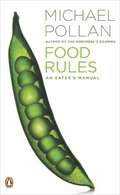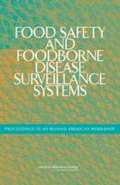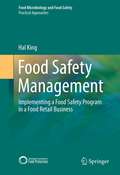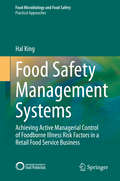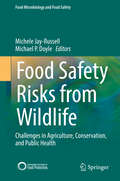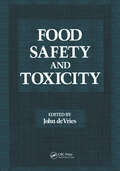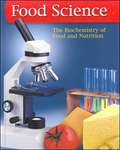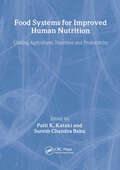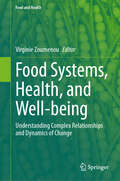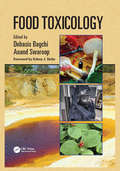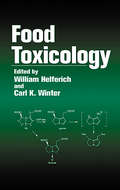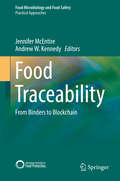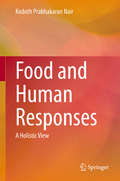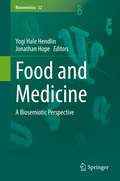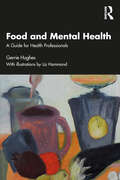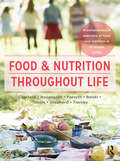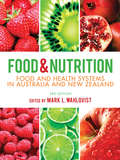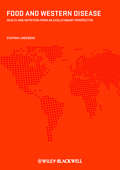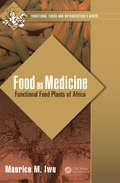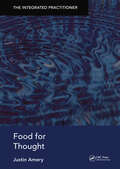- Table View
- List View
Food Rules: An Eater's Manual
by Michael PollanA pocket compendium of food wisdom from the author of The Omnivore's Dilemma and In Defense of Food, Michael Pollan, our nation's most trusted resource for food-related issues, offers this indispensible guide for anyone concerned about health and food.
Food Safety And Foodborne Disease Surveillance Systems: Proceedings Of An Iranian-american Workshop
by National Research Council of the National AcademiesIn October 2004 the Research Center for Gastroenterology and Liver Diseases of Shaheed Beheshti University hosted in Tehran an Iranian-American workshop on Food Safety and Surveillance Systems for Foodborne Diseases. The purposes of the workshop were to initiate contacts between Iranian and American specialists, exchange information about relevant activities in the two countries, and set the stage for future cooperation in the field. The participants also identified important aspects of food safety that should be addressed more intensively by both countries, including surveillance, research, international trade, and risk assessment. The framework for the workshop had been developed during a meeting of Iranian and American specialists in June 2003 in Les Treilles, France. More that 100 specialists participated in the workshop in their personal capacities, along with representatives of the World Health Organization and the Food and Agriculture Organization. These proceedings include a number of papers that were presented at the workshop together with summaries of discussions following presentation of the papers.
Food Safety Management
by Hal KingThe goal of this book is to show how to build and manage a food safety department that is tasked with ensuring food safety within a food retail business. The experiences of the author as the head of Food and Product Safety at Chick-fil-A will be used as the model. Specifically, the book will discuss the specific components of a food safety program, the tactics needed to establish these components (forming the majority of the chapters), how to measure the success of each component, and how to influence the organization to ensure resources to support the program. The book will also focus on how to choose and work with the appropriate partners, validate the value to the business, and initiate the new component throughout the organization, including how to sustain the component within the program. Five features of this book that make it distinctive are: - Most current "How to" book on leading a food safety department from the perspective of a respected national brand - Provides the proper organization and methods to manage the work necessary to ensure food safety within the organization - Provides the means to utilize risk-based decisions linked to business practices that accommodate a business analysis model - Demonstrates step-by-step examples that can be used for continuous improvement in sustaining food safety responsibilities - Provides examples on how to gain influence and obtain resources to support food safety responsibilities
Food Safety Management Systems: Achieving Active Managerial Control of Foodborne Illness Risk Factors in a Retail Food Service Business (Food Microbiology and Food Safety)
by Hal KingThis foodborne disease outbreak prevention manual is the first of its kind for the retail food service industry. Respected public health professional Hal King helps the reader understand, design, and implement a food safety management system that will achieve Active Managerial Control in all retail food service establishments, whether as part of a multi-restaurant chain or for multi-restaurant franchisees. According to the most recently published data by the Centers for Disease Control and Prevention (CDC), retail food service establishments are the most commonly reported locations (60%) leading to foodborne disease outbreaks in the United States every year. The Food and Drug Administration (FDA) has reported that in order to effectively reduce the major foodborne illness risk factors in retail food service, a food service business should use Food Safety Management Systems (FSMS); however less than 11% of audited food service businesses in a 2018 report were found using a well-documented FSMS. Clearly, there needs to be more focus on the prevention of foodborne disease illnesses and outbreaks in retail food service establishments. The purpose of this book is to help retail food service businesses implement FSMS to achieve Active Managerial Control (AMC) of foodborne illness risk factors. It is a key resource for retail professionals at all levels of the retail food service industry, and those leaders tasked to build and manage food safety departments within these organizations.
Food Safety Risks from Wildlife
by Michael P. Doyle Michele Jay-RussellFoodborne illnesses caused by zoonotic pathogens associated with wildlife hosts are an emerging microbial food safety concern. Transmission of foodborne pathogens can occur through ingestion, or improper handling, of contaminated game meat. Wild and feral animals have also been investigated as potential sources of Campylobacter, Escherichia coli O157:H7 and other enteric pathogens following foodborne disease outbreaks linked to fresh fruits and vegetables (e. g. , baby spinach in California, shelled-peas in Alaska, strawberries in Oregon). This book explores the range of bacterial, parasitic, and viral pathogens that have been described in wildlife populations in the United States, Europe and other parts of the world. It also addresses important challenges and solutions to balance agriculture, conservation, and public health goals. The book provides unique information on approaches in risk communication, co-management, and One Health in a wildlife-food safety context. The first five chapters review research on the detection, epidemiology and ecology of foodborne pathogens in wildlife populations including the influence of wildlife-livestock-human interactions. The second half of the book addresses current guidelines to mitigate microbial food safety risks from wildlife hosts and new regulations proposed by the U. S. Food and Drug Administration in the Food Safety Modernization Act Produce Safety Rule. Chapters are written by an array of internationally reco gnized authors, and will be of interest to agriculture safety experts, ecologists, environmental health specialists, food safety professionals, microbiologists, public health practitioners, veterinarians, wildlife biologists, and others in academia, government, industry, and students in these disciplines.
Food Safety and Toxicity
by John De VriesFood Safety and Toxicity examines the many problems and changes in food safety and toxicity. From a natural science viewpoint, this informative book takes on challenging and important topics impacting food researchers, regulators, producers, healthcare providers, educators, and consumers. It is organized into three main sections. Section 1 explores the relationship between the origin or formation of potentially toxic compounds and their eventual ingestion. Section 2 picks up with information on the potential consequences of this ingestion, and Section 3 concludes with the discussion of prevention and minimization of health risks. By emphasizing food safety, rather than nutritional toxicology, this book puts food hazards and their health risks in true perspective. It also explores the complementary roles of toxicology and epidemiology in studying associations between nutrition and adverse health effects and in assessing toxicological risks from food components in a deliberate manner. Food Safety and Toxicity, with clear, non-technical language and valuable insight, brings you up-to-date on the significant food safety issues confronting us today.
Food Science: The Biochemistry of Food and Nutrition
by Kay Yockey Mehas Sharon Lesley RodgersIn Food Science: The Biochemistry of Food and Nutrition students learn to use the scientific method as they study the biological and chemical basis of food and nutrition. The text combines scientific principles with real-life applications of food preparation and nutrition. It is taught by the Family and Consumer Sciences teacher, a Science teacher, or by the two together. Students will learn to apply scientific principles of food and nutrition as they explore foods and nutrition using basic scientific equipment. Measurement, use of equipment, problem solving, reasoning skills and writing are emphasized. This flexible text format is adaptable to a one or two semester course.
Food Security in Small Island States
by John Connell Kristen LowittThis book provides a contemporary overview of the social-ecological and economic vulnerabilities that produce food and nutrition insecurity in various small island contexts, including both high islands and atolls, from the Pacific to the Caribbean. It examines the historical and contemporary circumstances that have accompanied the shift from subsistence production to the consumption of imported, processed foods and drinks, and the impact of this transition on nutrition and the rise of non-communicable diseases. It also assesses the challenges involved in reversing this trend, and how more effective social and economic policies, agricultural and fisheries strategies, and governance arrangements could promote more resilient and sustainable small island food systems. It offers both theoretical and practical perspectives, and brings together a broad range of policy areas, e.g. agriculture, food, commerce, health, planning and socio-economic policy.Given its scope, the book offers a valuable resource for a range of disciplines in a number of regional contexts, and for the growing number of scholars and practitioners working on and in small island states. It will be of particular value as the first book to examine the diversity and commonalities of island states around the globe as they confront issues of food security.
Food Systems for Improved Human Nutrition: Linking Agriculture, Nutrition and Productivity
by Suresh Chandra Babu Palit KatakiLearn to produce crops with improved nutrition to alleviate malnourishment--using sustainable agriculture techniques!Utilizing complete food systems to improve nutrition has become a priority in the fight against malnutrition. This book examines all aspects of food systems, drawing on examples from various countries and geographical regions. Bringing together the most recent work of international experts, Food Systems for Improved Human Nutrition provides an important overview of the food systems approach. It also explores the extent of malnourishment in different areas; presents case studies from South Asia, China, India, Bangladesh, and East Africa; points to ways to improve food production and nutrient quality; and suggests directions for future research. Helpful charts and tables make the information in this well-referenced book easy to access and understand.Food Systems for Improved Human Nutrition brings you state-of-the-art information on: the potential benefits of agroforestry systems how to fortify food with micronutrients how to design population-appropriate nutrition interventions the ways that rapid economic change can affect human nutrition in a given area biotech approaches to improve nutrition in rice and maize crops crossbred cow technologies in the East African highlands and much more!
Food Systems, Health, and Well-being: Understanding Complex Relationships and Dynamics of Change (Food and Health)
by Virginie ZoumenouWhile the importance of food to health and well-being is clear, the specific ways in which food systems contribute to individual and community health are not well understood. This is a complex issue, which requires improving food systems as well as changing mindsets and behaviors of individuals within the food system. Many of the food-related health problems in the US disproportionately affect children, women, ethnic minorities, and low-income people. Addressing these problems requires that we understand more about the processes of institutional change, structural conditions, perceptions, and decision-making processes. The environment itself determines much of what individuals can draw from it. Community norms may dictate who has access to food assistance; engaged communities may provide more food assistance and may make food resources more easily accessible for the poor. In addition, consumer and producer attitudes and interests may conflict over some issues surrounding sustainability and health. The present volume focuses on food production, distribution and consumption, and their effects on individual health. The text is divided into three parts: Part One focuses on the relationship between food systems, families, health, sociodemographic and environmental factors; Part Two explores the relationship between food systems, food advertisements, and community engagement; and Part Three discusses current research and interventions toward a more equitable food system.
Food Toxicology
by Debasis Bagchi Anand SwaroopFood toxicology studies how natural or synthetic poisons and toxicants in diverse food products cause harmful, detrimental, or adverse side effects in living organisms. Food toxicology is an important consideration as food supply chain is becoming more multinational in origin, and any contamination or toxic manifestation may cause serious, wide-spread adverse health effects. Food Toxicology covers various aspects of food safety and toxicology, including the study of the nature, properties, effects, and detection of toxic substances in food and their disease manifestations in humans. It will also include other aspects of consumer product safety. The first two chapters discuss the measurement of toxicants and toxicity and the importance of dose-response in food toxicology. Additional chapters discuss the aspects of food associated carcinogenesis and food-derived chemical carcinogenesis, food allergy, pathogens associated with fruits and vegetables, and the detrimental effects of radionuclides exposure. The chapters also cover the most important heavy metal contaminants, namely mercury, lead and vanadium, and Fluoride toxicity, which is extensively discussed in its own chapter. Toxicologists, scientists, researchers in food toxicology, nutritionists, and public health care professionals will find valuable information in this book on all possible intricate areas of food toxicology.
Food Toxicology
by William Helferich Carl K. WinterNew data continually indicate that antioxidants may contribute to reductions in cancer risks and that chronic consumption of low levels of chemical carcinogens in our diet may contribute to an increased risk of developing specific types of cancers. Research also shows that in America today, the leading causes of death are cancer and heart disease.
Food Traceability: From Binders to Blockchain (Food Microbiology and Food Safety)
by Jennifer McEntire Andrew W. KennedyThis book provides a picture of food traceability for all aspects of the food system, recognizing the unique differences, challenges, and “states of the industry” in different types of food products, as well as the different pressures and opportunities at different points in the supply chain and the research that has already been done. It also provides some historical context, along with the types of solutions available to the food industry, and the benefits associated with better recordkeeping that go beyond the public good and impact the bottom line. Whenever a food related outbreak occurs, traceability is called into question. When lives are at stake, it is critical that the root of the problem is quickly identified to prevent further illness. Once the problem is found, it’s just as important to contain it quickly. Too often, recalls expand because implicated product is not readily accounted for. Mention of traceability stirs fear for many in the food industry for several reasons: within a company, it’s not clear if responsibility for traceability lies with food safety professionals involved in recalls, supply chain professionals who understand product movement, IT professionals who build and maintain the recordkeeping systems, or regulatory professionals who need to respond to government requests for information. There is also a sense that traceability is someone else’s problem. Few firms admit that they are the weak link and instead tout how quickly they can perform mock recalls. But traceability is about more than just recalls. It is about the connectivity of the supply chain as a product and its constituents travel from the farm to the consumer. Because it is a systems issue, there is a sense that the investment by a single firm will be meaningless if supply chain partners don’t have comparable abilities. This book will address both these surrounding issues and solutions.
Food and Human Responses: A Holistic View
by Kodoth Prabhakaran NairThis book discusses the role of food and the human nutrition-behavior interface. Food makes us what we are, but in addition to providing adequate nutrition, does it influence behavior? This book looks at this critical question from various angles and considers different concepts and approaches to food, nutrition and well-being. To better understand the entire gamut of the food-behavior linkage, the author unravels the workings of the mind - brain link. The book discusses this aspect and the findings add to the existing fund of knowledge in this area. Much of today’s malaise in humans can be traced to the food consumed by individuals. This book provides a comprehensive picture of the current state of human nutrition and how this can be linked to behavior.
Food and Medicine: A Biosemiotic Perspective (Biosemiotics #22)
by Jonathan Hope Yogi Hale HendlinThis edited volume provides a biosemiotic analysis of the ecological relationship between food and medicine. Drawing on the origins of semiotics in medicine, this collection proposes innovative ways of considering aliments and treatments. Considering the ever-evolving character of our understanding of meaning-making in biology, and considering the keen popular interest in issues relating to food and medicines - fueled by an increasing body of interdisciplinary knowledge - the contributions here provide diverse insights and arguments into the larger ecology of organisms’ engagement with and transformation through taking in matter. Bodies interpret molecules, enzymes, and alkaloids they intentionally and unintentionally come in contact with according to their pre-existing receptors. But their receptors are also changed by the experience. Once the body has identified a particular substance, it responds by initiating semiotic sequences and negotiations that fulfill vital functions for the organism at macro-, meso-, and micro-scales. Human abilities to distill and extract the living world into highly refined foods and medicines, however, have created substances far more potent than their counterparts in our historical evolution. Many of these substances also lack certain accompanying proteins, enzymes, and alkaloids that otherwise aid digestion or protect against side-effects in active extracted chemicals. Human biology has yet to catch up with human inventions such as supernormal foods and medicines that may flood receptors, overwhelming the body’s normal satiation mechanisms. This volume discusses how biosemioticians can come to terms with these networks of meaning, providing a valuable and provocative compendium for semioticians, medical researchers and practitioners, sociologists, cultural theorists, bioethicists and scholars investigating the interdisciplinary questions stemming from food and medicine.
Food and Mental Health: A Guide for Health Professionals
by Gerrie HughesWritten by an experienced psychotherapist, this book provides professionals in the fields of health and wellbeing with a guide to human relationships with food, and their impact on mental health. Acknowledging how food choices profoundly effect a person’s experience in the world, Gerrie Hughes offers knowledge and support around how to understand and negotiate the relationship between food and mind. Chapters offers facts, information and theories on key topics such as self-image, ‘good’ nutrition, sustainability and rituals. Each chapter uses vignettes, case studies and reflective activities to stimulate thought about the reader’s own assumptions and experience and offer approaches to how they might use their expertise with the people with whom they work. Providing an accessible and easy to read guide into the role food plays in our lives, this book will be of interest to a range of healthcare practitioners, including mental health nurses, occupational therapists, psychotherapists, and counsellors.
Food and Nutrition Throughout Life: A comprehensive overview of food and nutrition in all stages of life
by Sue Shepherd Regina Belski Adrienne Forsyth Catherine Itsiopoulos Antonia Thodis Audrey Tierney Sharon CroxfordNutritional requirements vary greatly according to age and lifestyle. This evidence-based, comprehensive text is a complete guide to eating habits across age and population groups. It provides the recommendations for intakes of nutrients and foods, and diet to achieve optimum health.Chapters systematically examine the nutritional issues for individuals from preconception, pregnancy and breastfeeding through to adulthood and old age. The text features an overview of dietary patterns by age group based on national scientific survey data together with the latest recommendations for optimum nutrition to maintain well-being and address specific health concerns. The final section examines nutrition issues for specific populations including indigenous groups, athletes and the disadvantaged. Throughout the text, key points are illustrated by case studies and the reader's knowledge is tested via quizzes and study questions.With chapters from leading nutrition researchers and educators in Australia, New Zealand and Asia, this is an excellent introduction to nutrition through the lifespan.'A comprehensive overview and detailed discussion of food and nutrition topics for all ages and stages of life.' - Robynne Snell, Curtin University
Food and Nutrition: Food and health systems in Australia and New Zealand
by Jan Payne Janis Baines Danielle Gallegos Mark L. Wahlqvist Madeleine Ball Jonathan M. Hodgson Gwyn P. Jones Antigone Kouris-Blazos Louise B. Lennard Ingrid H.E. Rutishauser Gayle S. Savige Kelly L. Stewart Naiyana WattanapenpaiboonMark Wahlqvist's Food and Nutrition is widely regarded as the most authoritative introduction to nutrition and dietetics in the region. It provides a comprehensive overview of nutrition needs at different life stages, the biochemistry of foods, dietary disorders, and the social, political and environmental contexts of food production and consumption.This third edition has been completely revised and significantly expanded to encompass recent developments in nutritional science, technology and policy. It includes new material on genetics, regulation, food production, birth weight, lifestyle and cancer, and the implications of climate change for food production, safety and availability. Chapters are extensively illustrated with data and diagrams.The book is divided into the following sections:* Human nutrition* Food systems, security and policy* The biology of food components* Lifespan nutrition* Food and disease* Food and nutrition for individuals and societyWith chapters from leading nutritionists, Food andNutrition is an indispensable student text and a valuable professional reference.
Food and Nutritional Toxicology
by Stanley T. OmayeFood and Nutritional Toxicology provides a broad overview of the chemicals in food that have the potential to produce adverse health effects. The book covers the impact on human health of food containing environmental contaminants or natural toxicants, food additives, the migration of chemicals from packaging materials into foods, and the persisten
Food and Western Disease: Health and Nutrition from an Evolutionary Perspective
by Staffan LindebergNutrition science is a highly fractionated, contentious field with rapidly changing viewpoints on both minor and major issues impacting on public health. With an evolutionary perspective as its basis, this exciting book provides a framework by which the discipline can finally be coherently explored. By looking at what we know of human evolution and disease in relation to the diets that humans enjoy now and prehistorically, the book allows the reader to begin to truly understand the link between diet and disease in the Western world and move towards a greater knowledge of what can be defined as the optimal human diet. Written by a leading expert Covers all major diseases, including cancer, heart disease, obesity, stroke and dementia Details the benefits and risks associated with the Palaeolithic diet Draws conclusions on key topics including sustainable nutrition and the question of healthy eating This important book provides an exciting and useful insight into this fascinating subject area and will be of great interest to nutritionists, dietitians and other members of the health professions. Evolutionary biologists and anthropologists will also find much of interest within the book. All university and research establishments where nutritional sciences, medicine, food science and biological sciences are studied and taught should have copies of this title.
Food and the Immune System: Molecular Mechanisms and Nutritional Relevance in Health and Disease
by Christopher BeermannNutrition is an important environmental factor for the maturation of the human immune system and essential for maintaining immunological homeostasis. Based on this, a variety of food applications with medical claims are being generated by food manufacturers worldwide in order to expand the market potential of products creating interesting linkages with other market segments, such as cosmetics and pharmaceuticals. However, in addition to the health benefits, active principles of such components often remain unexplored.This book focusses on the specific interactions between food ingredients and the immune system along the entire immune defense response. Starting from the immune barrier, through the innate and adaptive immune response, to active limitation and termination, all major mechanisms of the immune response are addressed and different biochemical, cellular and genetic interactions of components of our diet are discussed. The book presents a wealth of disease patterns for which nutritional factors are relevant and thereby provides indications for potential intervention strategies. In addition, associated food-technological aspects are discussed. Being the first of its kind, this book provides an overview of the variety of functional food components and their influence on immunological responses. Written in an accessible style, it addresses researchers, health professionals and students with different scientific backgrounds.
Food as Medicine: Functional Food Plants of Africa (Functional Foods and Nutraceuticals)
by Maurice M. IwuThis comprehensive book documents African plants used for functional and medicinal foods. It contains more than 60 detailed monographs of African foods, describing foods with various characteristics such as prebiotic, probiotic, satiety, immune modulation, stress-reduction, sports performance, mental acuity, sleep-supporting, metabolic syndrome, antioxidant, and unsaturated fats. Plant description, botanical names and synonyms, plant part used, habitat and distribution, folk use, nutritional content, and chemistry are all fully detailed. The book highlights indigenous African food processing technologies up to the modern era.
Food for Thought: The Integrated Practitioner
by Justin AmeryEverything that exists, exists against a background. All of our experiences, beliefs and understandings of health practice derive from a living, organic and constantly moving context: whether scientific, philosophical, cultural, aesthetic, biological or spiritual. It is useful therefore to spend a little time understanding and reflecting on these building blocks of who we are. As practitioners, we don't always have time to do this...A little luxury...not essential, but hopefully a bit nourishing. Like a fireside cup of cocoa. - Justin Amery This extraordinary new series fills a void in practitioner development and well-being. The books take a reflective step back from the tick-box, target-driven and increasingly regulated world of 21st century health practice; and invite us to revisit what health and health practice actually are. Building carefully on the science and philosophy of health, each book addresses the messy, complex and often chaotic world of real-life health practice and offers an ancient but now almost revolutionary understanding for students and experienced practitioners alike: that health practice is a fundamentally creative and compassionate activity. The series as a whole helps practitioners to redefine and recreate their daily practice in ways that are healthier for both patients and practitioners. The books provide a welcome antidote to demoralisation and burn-out amongst practitioners, reversing cynicism and reviving our feeling of pride in, and our understanding of, health practice. By observing practice life through different lenses, they encourage the development of efficiency, effectiveness and, above all, satisfaction. The fifth book in this series, The Integrated Practitioner: Food for Thought, written for readers who prefer a more academic and reflective understanding of the themes of books 1-4.
Food for Today
by Glencoe Mcgraw-HillTreat students to the best and most comprehensive foods textbook with Glencoe's Food for Today! Content is based on the latest research-based nutrition to develop lifelong healthy eating habits. Numerous illustrations, step-by-step activities, and visualization of correct portions are included. All new FACS standards for the foods classroom are met. Focus on food prep and kitchen basics include kitchen tools, safety, and sanitation. Topic-related and point-of-use academic integration with Science in Action and Kitchen Math features help teachers meet Perkins mandates. English language arts and writing activities correlated to national standards. New and revised focus on light and healthy recipes. International recipes are provided. Activities that develop consumer savvy about food choices, nutrition, and keeping a grocery budget are incorporated. Hands-on Kitchen Lab and unit-long projects reinforce concepts through application.
Food for Today (9th edition)
by Helen KowtalukA comprehensive lab-based foods and nutrition program for high school students. It is correlated to the National Standards for Family & Consumer Sciences. Students learn how to make healthy and nutritious food decisions reflecting the most current nutritional guidelines, how to plan meals safely, how to prepare food, how to appreciate food diversity, how science and technology impact foods and nutrition, and about career opportunities in the area of foods and nutrition.
